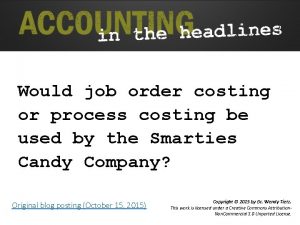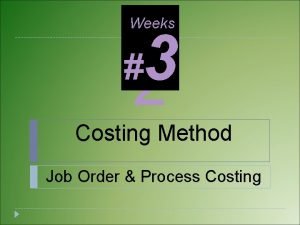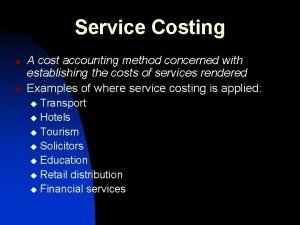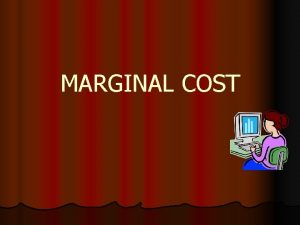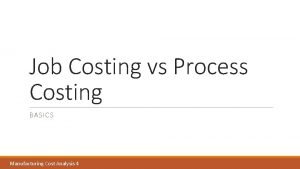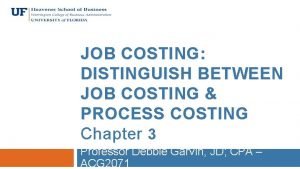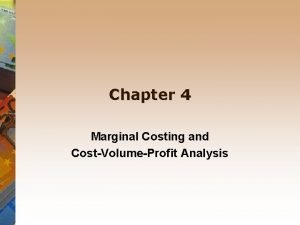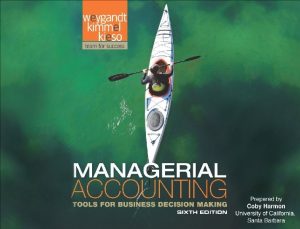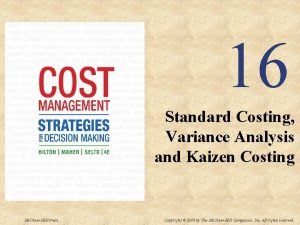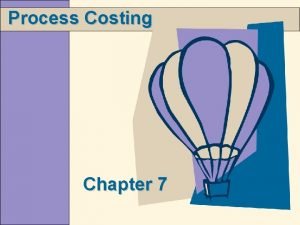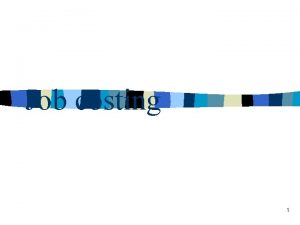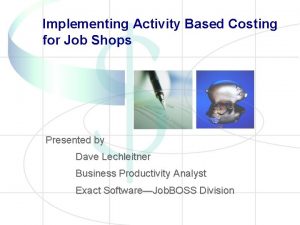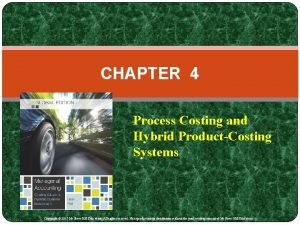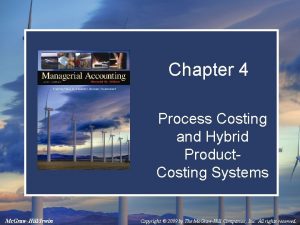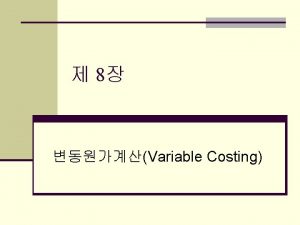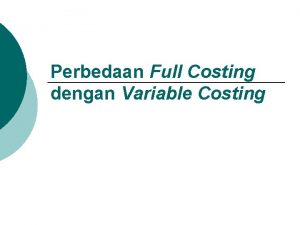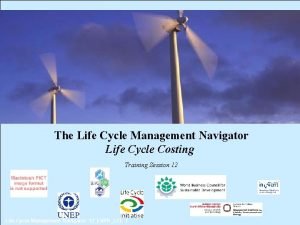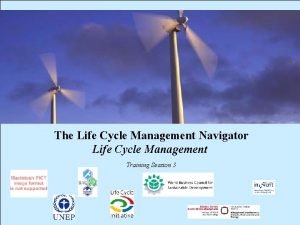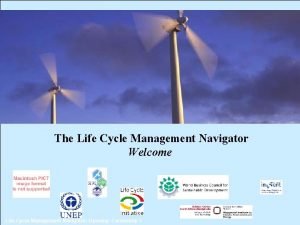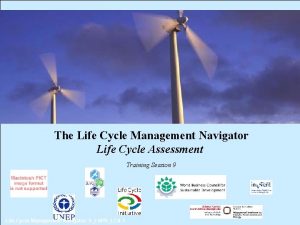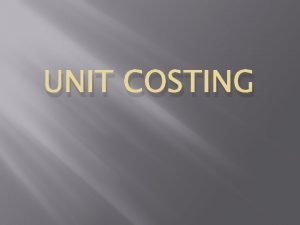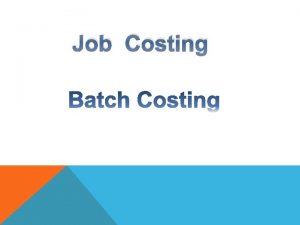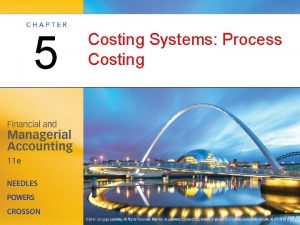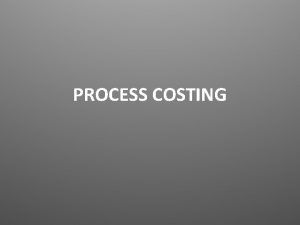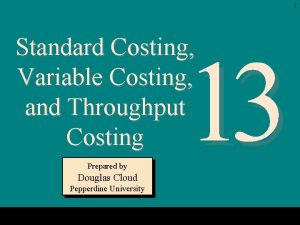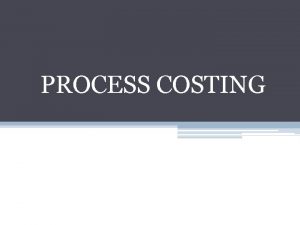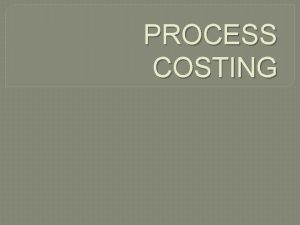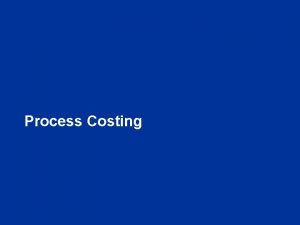The Life Cycle Management Navigator Life Cycle Costing



















- Slides: 19

The Life Cycle Management Navigator Life Cycle Costing Training Session 12 Life Cycle Management Navigator: 12_PR_LCC 1 CSCP, UNEP, WBCSD, WI, In. WEnt, UEAP ME

Life Cycle Costing What? The LCC Message! Life Cycle Costing (LCC) helps you to. . . 1. reduce costs and 2. improve life cycle performance. . . through. . . • identification, • evaluation and • more accurate allocation of life cycle costs. Life Cycle Management Navigator: 12_PR_LCC 2 CSCP, UNEP, WBCSD, WI, In. WEnt, UEAP ME

Life Cycle Costing What? What are Life Cycle Costs? Life cycle costs can be. . . • potentially hidden costs; e. g. costs for purchasing, processing and disposing nonproduct output (NPO), costs for inefficient resource-use, insurance, monitoring, training. • contingent costs; e. g. costs for penalties, natural resource or personal injury damages, future compliance costs. • image and relationship costs. e. g. costs for advertising, lower earnings due to environmental image. Life Cycle Management Navigator: 12_PR_LCC 3 CSCP, UNEP, WBCSD, WI, In. WEnt, UEAP ME

Life Cycle Costing What? Functions of LCC intends to: • promote more accurate costing and pricing; • help identify potentials for cost reduction; • provide information on life cycle costs; • support (life cycle) controlling / decision-making. Life Cycle Management Navigator: 12_PR_LCC 4 CSCP, UNEP, WBCSD, WI, In. WEnt, UEAP ME

Life Cycle Costing LCC - A Management Accounting Tool LCC is primarily used • by management • for internal purposes • to support decisionmaking in various business areas. . . Where? Business decisions benefitting from LCC: • product design • process design • facility siting • procurement • processing • waste management • risk management • capital investments • costing and pricing Source: US EPA Life Cycle Management Navigator: 12_PR_LCC 5 CSCP, UNEP, WBCSD, WI, In. WEnt, UEAP ME

Life Cycle Costing Why? Information Gap Disposal costs are just the tip of the iceberg costs for disposal other life cycle costs Life Cycle Management Navigator: 12_PR_LCC 6 CSCP, UNEP, WBCSD, WI, In. WEnt, UEAP ME

Life Cycle Costing Information Gap and Resulting Problems Why? • Traditional accounting systems are incomplete in scope because they overlook important environmental costs (and potential cost savings and revenues), which can be a significant component of a company’s overall cost structure. • The failure to include environmental costs adequately in financial analyses has the effect of sending the wrong financial signals to managers. • When environmental costs are not adequately allocated, cross-subsidisation occurs between products. Life Cycle Management Navigator: 12_PR_LCC 7 CSCP, UNEP, WBCSD, WI, In. WEnt, UEAP ME

Life Cycle Costing Why? Cost Reduction & Profitability Enhancement You pay at least 3 times for your non-product output (NPO) 1. Procurement 2. Processing 3. Disposal (Marketing) desired products � Input Output Throughput � costs of NPO + 10 -30% of total production costs unwanted NPO costs of NPO = Total costs of NPO Source: Fischer et al. Life Cycle Management Navigator: 12_PR_LCC 8 CSCP, UNEP, WBCSD, WI, In. WEnt, UEAP ME

Life Cycle Costing Why? Some Figures • Kienbaum Consultants International estimates that LCC discovers cost reduction potentials of 1 -2% of total costs. • Gt. Z estimates that total NPO costs account for 10 -30% of total production costs and that LCC enables to reduce total production costs 1 -5% within one year. • Bosch-Siemens-Hausgeräte Gmb. H: In 3 years total waste reduction of 20%, reduction of waste for disposal of 45%. � A reduction of total costs by 1 -5% equals increased profits of 20 -100%! Life Cycle Management Navigator: 12_PR_LCC 9 CSCP, UNEP, WBCSD, WI, In. WEnt, UEAP ME

Life Cycle Costing Why? Increased Profitability Additional profits of of 20 -100% Profit NPO costs Production and other costs Source: Wuppertal Institute Life Cycle Management Navigator: 12_PR_LCC 10 CSCP, UNEP, WBCSD, WI, In. WEnt, UEAP ME

Life Cycle Costing Why? Benefits of LCC • cost reduction and avoidance; • profitability enhancement; • increased product quality; • staff motivation; • better decision-making including life cycle aspects; • satisfying information demands; • improvement of life cycle performance. � COMPETITIVE ADVANTAGE Life Cycle Management Navigator: 12_PR_LCC 11 CSCP, UNEP, WBCSD, WI, In. WEnt, UEAP ME

Life Cycle Costing How? Steps to take Non-product output (NPO) as a starting point. . . 1. Make your NPO transparent 3. Check results and review 2. Use improvement potentials Life Cycle Management Navigator: 12_PR_LCC 12 CSCP, UNEP, WBCSD, WI, In. WEnt, UEAP ME

Life Cycle Costing How? Step 1 1. Make your NPO transparent Key questions: • Do you know the amount of NPO your company “produces”? • Do you know the sources of NPO? Where does NPO arise? • Do you know the costs belonging to NPO? � Identify (most relevant) NPO flows and associated costs Life Cycle Management Navigator: 12_PR_LCC 13 CSCP, UNEP, WBCSD, WI, In. WEnt, UEAP ME

Life Cycle Costing How? Step 2 2. Use improvement potentials “Pick the low hanging fruits first!” Key questions: • Identification of most beneficial NPO flows. • Detailed description of those NPO flows in physical and monetary units. • Development and implementation of improvement measures. Life Cycle Management Navigator: 12_PR_LCC 14 CSCP, UNEP, WBCSD, WI, In. WEnt, UEAP ME

Life Cycle Costing How? Step 3 3. Check results and review Key elements: • Monitoring performance. • Evaluation of performance. • Development and implementation of further improvement measures. � Ensure continuous improvement Life Cycle Management Navigator: 12_PR_LCC 15 CSCP, UNEP, WBCSD, WI, In. WEnt, UEAP ME

Life Cycle Costing How? Further Opportunities Non-product output (NPO) NPO is a good starting point for implementing LCC especially in SMEs, but LCC offers more. . . Further opportunities • track other life cycle costs; e. g. inefficient resource-use • improve product design, investment decisions etc. Life Cycle Management Navigator: 12_PR_LCC 16 CSCP, UNEP, WBCSD, WI, In. WEnt, UEAP ME

Life Cycle Costing How? Further Opportunities In the building sector: Objective: Promoting a worldwide adoption of sustainable buildings and construction practices • Provide a common platform for addressing sustainability issues • Establish baselines based on the life cycle approach • Develop tools and stategies for achieving adoption of sustainable building practices • Implementation through pilot projects Source: www. unepsbci. org Life Cycle Management Navigator: 12_PR_LCC 17 CSCP, UNEP, WBCSD, WI, In. WEnt, UEAP ME

Life Cycle Costing Further Opportunities Example Investment costs + Capital replacement costs - Residual value + Disposal costs + Energy and Water costs + Non-fuel operating, maintenance and repair costs + other costs i Life cycle costs All costs are discounted Source: www. wbdg. org Life Cycle Management Navigator: 12_PR_LCC 18 CSCP, UNEP, WBCSD, WI, In. WEnt, UEAP ME

Life Cycle Costing Tips for Action! Tips • It is not necessary to undertake a detailed material and energy flow analysis at the very beginning. • To become familiar with LCC you may first choose one type of NPO and figure out how LCC works. • Start with the most beneficial NPO flow(s). • Build up a team of several business units accompanying the entire LCC process. Life Cycle Management Navigator: 12_PR_LCC 19 CSCP, UNEP, WBCSD, WI, In. WEnt, UEAP ME
 Companies that use job order costing
Companies that use job order costing Process and job order operations are similar in that both
Process and job order operations are similar in that both Difference between service costing and product costing
Difference between service costing and product costing Absorption costing vs marginal costing
Absorption costing vs marginal costing Process costing vs job costing
Process costing vs job costing How to find manufacturing overhead
How to find manufacturing overhead Contract costing definition
Contract costing definition Variable costing vs absorption costing
Variable costing vs absorption costing Marginal cost approach
Marginal cost approach Advantages of activity based costing
Advantages of activity based costing Job order vs process costing
Job order vs process costing Abc costing vs traditional costing
Abc costing vs traditional costing Kaizen costing vs standard costing
Kaizen costing vs standard costing Process costing and hybrid product-costing systems
Process costing and hybrid product-costing systems Process costing and hybrid product-costing systems
Process costing and hybrid product-costing systems Activity based costing vs job costing
Activity based costing vs job costing Cost production report
Cost production report Process costing and hybrid product-costing systems
Process costing and hybrid product-costing systems Marginal costing and absorption costing
Marginal costing and absorption costing Perbedaan full costing dan variable costing
Perbedaan full costing dan variable costing
